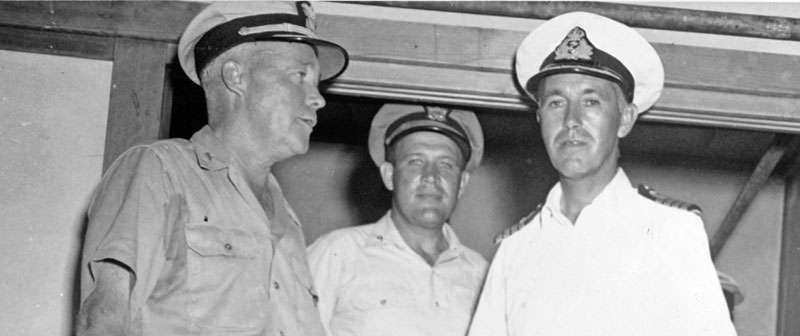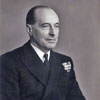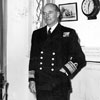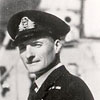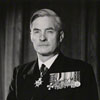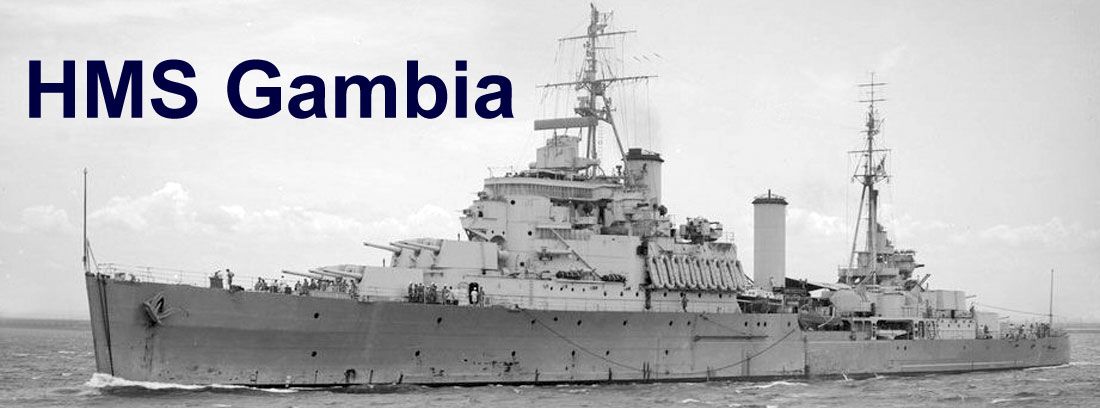
Commanders and Captains
November 25 1941 - June 23, 1943
Captain Maurice James Mansergh, RN
October 14, 1896 - September 29, 1966
Admiral Sir Maurice James Mansergh KCB CBE (1896–1966) was a Royal Navy officer who went on to be Commander-in-Chief, Plymouth. Mansergh joined the Royal Navy in 1914 at the start of World War I and served on the battleship HMS Zealandia and was promoted to midshipman on May 15, 1914. On March 15, 1916, he was promoted to A/S.Lt. (Acting Sub-Lieutenant), to Sub-Lieutenant on September 11, 1916, and to Lieutenant on October 30, 1917.
From 1921, he specialized in navigation and on October 30, 1925 was promoted to Lt.Cdr. (Lieutenant Commander). He attended the RN Staff College in 1933, and served on the staff of Commander-in-Chief, Mediterranean from 1934 to 1935. He then served as Executive Officer on HMS Rodney from 1936 to 1937 and was promoted to Captain on June 30, 1937.
1938 saw him at the Imperial Defence College. In 1939 he became Director of the Trade Division at the Admiralty where his main role was the protection of shipping. He served in World War II as Deputy Assistant Chief of the Naval Staff (Trade). He received the CBE (Commander of the Most Excellent Order of the British Empire) on January 1, 1941 and served as Captain on HMS Gambia from November 25, 1941, until June 23, 1943.
After leaving Gambia, he was made Deputy Chief of Staff and subsequently Chief of Staff to the Allied Naval Commander-in-Chief for the Normandy Invasion Expeditionary Force in 1943, where he stayed until the end of the war in 1945. He had been Mentioned in Despatches on November 28, 1944 and attained the CB (Companion of the Order of the Bath on April 10, 1945.
After the war he became Commodore commanding 15th Cruiser Squadron, becoming Rear-Admiral on July 5, 1946 and the same year he became Naval Secretary to the First Lord of the Admiralty. In 1948, he was appointed Commander of the 3rd Aircraft Carrier Squadron, and Fifth Sea Lord and Deputy Chief of Naval Staff (Air) in 1949. On September 30, 1949, he was promoted to Vice-Admiral.
He was appointed Commander-in-Chief, Plymouth in 1951. On January 1, 1952 he received the KCB (Knight Commander of the Most Honourable Order of the Bath, promoted to Admiral on March 18, 1953 and retired on March 30, 1954 after 40 years of service.
June 23, 1943 - August 24, 1943
Commander Leslie Edward Moncaster, RN
Born: 26 September 26, 1904
Career
December 1, 1928 - Mate
August 1, 1931 - Lt.
August 1, 1939 - Lt.Cdr.
December 31,1942 - Cdr.
August 24, 1943 - March 15, 1945
Captain Newton James Wallop William-Powlett, DSC, RN
June 26, 1896 - November 10 1963
Career
January 15, 1914 - Mid.
January 15, 1916 - A/S.Lt.
May 31, 1916 - Awarded DSC
August 30, 1916 - S.Lt.
March 30, 1917 - Lt.
March 30, 1925 - Lt.Cdr.
June 30, 1931 - Cdr.
December 31 1938 - Capt.
January 8, 1948 Retired
March 15, 1945 - August 1945
Captain Ralph Alan Bevan Edwards, RN
Born: March 31, 1901
Officers of the U.S. and British Navies on board USS Lunga Point, 11 September 1945. They are (from left to right, front): Rear Admiral Ralph S. Riggs, USN, Commander Cruiser Division 12; Captain R.A.B. Edwards, RN, Commanding Officer, HMS Gambia; and Captain Joseph L. Kane, USN, Chief of Staff for Commander Escort Carrier Forces, Pacific. Collection of Vice Admiral Calvin T. Durgin. Donated by his daughter, Mrs. Phyllis Durgin Sherrill, 1969. Official U.S. Navy Photograph, from the collections of the Naval History and Heritage Command NH 69409.
Career
September 15, 1914 - Cadet
May 15, 1920 - A/S.Lt.
January 15, 1921 - S.Lt.
December 15, 1922 - Lt.
December 15, 1930 - Lt.Cdr.
June 30, 1934 - Cdr.
June 30, 1939 - Capt.
June 2, 1943 - Awarded CBE
July 10, 1948 - Rear-Admiral
June 8, 1950 - Awarded CB
January 26, 1952 - Vice-Admiral
January 1, 1954 - Awarded KCB
April 22, 1955 - Admiral
May 15, 1958 - Retired
August 1945
Commander Christopher Michael Jacob, DSC, RN
Born: November 27, 1905
Career
January 15, 1926 - A/S.Lt.
July 15, 1926 - S.Lt.
August 15, 1927 - Lt.
August 15, 1935 - Lt.Cdr.
June 30, 1941 - Cdr.
October 14, 1941 - Awarded DSC
May 16, 1954 - Retired
Admiral Sir Robin Leonard Francis Durnford-Slater KCB
July 9, 1902 – June 28, 1984
Leonard Francis Slater was born on July 9, 1902 in the Punjab area of India, the son of Leonard Slater an Army Captain and his wife Constance Durnford Slater.
Durnford-Slater joined the Royal Navy in 1923. He served in World War II, initially as Executive Officer on the aircraft carrier HMS Hermes which was sunk in 1942 after which he joined the torpedo school HMS Vernon. He next became Senior Officer for the 42nd and the 7th Escort Group of Western Approaches Command. Later he became Training Captain on the staff of the Commander-in-Chief, Western Approaches Command and finally Director of Underwater Weapons at the Admiralty.
After the War he became Senior Officer for 1st Escort Flotilla in the Far East Fleet. He went on to be Commandant at the School of Amphibious Warfare and then Captain of the cruiser HMS Gambia. In 1953 he was made Deputy Controller of the Navy. He commanded the Naval Forces during Suez Crisis in 1956. After that he was made Flag Officer, Second in charge of the Mediterranean Fleet and then, from 1958, the last Commander-in-Chief, The Nore. He retired in 1961.
1952 - 1954
Vice Admiral Sir Peter William Gretton KCB, DSO & Two Bars, OBE, DSC
August 27, 1912 – November 11, 1992
Early Career
Peter William Gretton was born on August 27, 1912 at Farnham, Surrey. He joined the Royal Navy as a cadet at the Royal Naval College, Dartmouth in 1926. He joined HMS Renown as Midshipman in the Mediterranean in 1930. He was promoted on Sub lieutenant on May 1, 1933 and Lieutenant on June 1, 1934 while serving on the Royal Yacht, Victoria and Albert. He served in the aircraft carrier Courageous before seeing action in the cruiser HMS Durban during the Abyssinia crisis and the Spanish Civil War. He led a landing party in Haifa during the Arab rebellion in Palestine which assisted the Army in protecting truck convoys and later aiding police to control the Souk for which he was awarded the Distinguished Service Cross on November 5, 1936. He was subsequently appointed Seamanship and Sports Officer at the boys' training establishment, HMS Impregnable, at Devonport, and then spent two years as a House Officer at Dartmouth. In 1939, he attended an anti-submarine course at Portland and, on the outbreak of the Second World War, was assigned to the destroyer HMS Vega as first lieutenant for convoy duty.
Second World War
After a short period with Vega, from September 1939 to April 1940, Gretton was appointed as the first lieutenant with the destroyer HMS Cossack and saw action at the Second Battle of Narvik during the Norwegian Campaign. He was given command of the destroyer HMS Sabre on January 11, 1941 and served in the North Atlantic, again on convoy duties. He received the Order of the British Empire on July 1, 1941. Promoted to Lieutenant Commander on June 1, 1942, he was given command of the destroyer HMS Wolverine on March 3, 1942, and returned to the Mediterranean. He took part in Operation Pedestal, the Malta convoy operation in August 1942, and sank the Italian submarine Dagabur by ramming it. He received the Distinguished Service Order on October 1942 and a bar to it on November 10 the same year. Promoted to commander on December 31, 1942, he was given command of the destroyer HMS Duncan on April 12, 1943, as Senior Officer Escort to Escort Group B7, based in Derry. On November 6, 1943 he took command of the destroyer HMS Vidette and was awarded the second bar to his DSO on April 18, 1944.
Post War
Promoted to captain on June 30, 1948, Gretton became Naval Assistant to the First Sea Lord, commanding HMS Gambia, and then Chief of Staff to the Senior Naval Officer at the Joint Services Mission in Washington, D.C. before being given command of the Naval task group for Operation Grapple in 1956. Promoted to rear-admiral on July 7, 1958, he became Senior Naval Member of the Directing Staff at the Imperial Defence College in 1958 and Flag Officer, Sea Training in 1960. On January 1, 1960 he was awarded the Companion to the Bath. Promoted to vice-admiral on March 10, 1961, he went on to be Deputy Chief of the Naval Staff and Fifth Sea Lord in 1962 and became Knight Companion to the Bath on January 1, 1963. He retired through ill-health on May 30, 1963.
After Navy Service
Gretton served as the Domestic Bursar of University College, Oxford from 1965 until 1971, and became a senior research fellow in 1971. He published widely on defence matters and was the President of the Royal Humane Society. His published works include: Convoy Escort Commandee (1964); Maritime Strategy (1965); Former Naval Person - Churchill and the Navy (1968); and Crisis Convoy - The Story of HX231 (1974). He died on 11 November 1992 at the age of 80 in Oxford.
Sources
Archives in London and the M25 Area
Charlesmccain.com
National Portrait Gallery
Uboat.net
Wikipedia
1957 - 1958
Captain: Edward Trevor Lloyd "Dusty" Dunsterville
Sources
Geni (Mansergh)
Uboat.net
Wikipedia (Mansergh)
World War II: Unit Histories and Officers (Mansergh)
